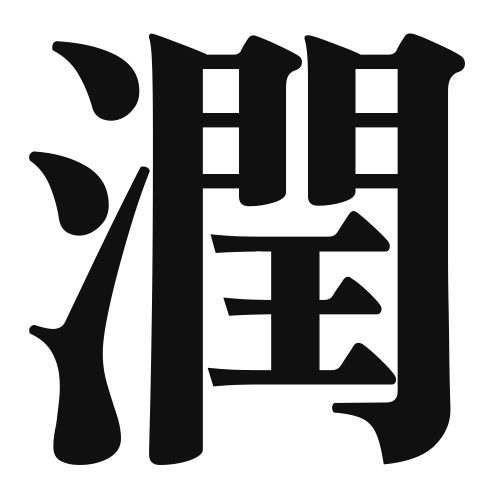1. Overview of Meaning
The kanji “潤” (pronounced “jun”) generally means “moist,” “rich,” or “to enrich.” It conveys a sense of nourishment and abundance, often associated with water or moisture that enhances life.
2. Formation and Radical
Formation of the Kanji: The kanji “潤” is a phonetic-ideographic character (形声文字). It combines the water radical (氵) on the left, which relates to moisture, with the phonetic component “潤” (run), suggesting the sound and meaning associated with richness and moisture.
Radical: The radical of “潤” is 氵, which is a variant of 水 (water), indicating its connection to liquid and moisture.
3. Examples of Usage
Common Words and Phrases: Some frequently used words that include “潤” are:
- 潤滑 (じゅんかつ, junkatsu) – lubrication
- 潤い (うるおい, uruoi) – moisture, richness
Example Sentences in Daily Conversation:
- このクリームは肌に潤いを与えます。 (This cream provides moisture to the skin.)
- 潤滑油を使って、機械をスムーズに動かしましょう。 (Let’s use lubricant to make the machine run smoothly.)
4. Synonyms and Antonyms
Similar Kanji: A kanji with a similar meaning is “豊” (pronounced “yutaka”), which means “abundant” or “rich,” but it emphasizes wealth and prosperity rather than moisture.
Antonyms: A kanji with an opposite meaning is “乾” (pronounced “kan”), which means “dry” or “to dry,” indicating a lack of moisture.
5. Cultural and Historical Background
Connection to Japanese Culture: In Japanese culture, “潤” is often associated with the idea of fertility and prosperity, especially in agricultural contexts where water is essential for crops.
Proverbs and Idioms: One common expression is “潤いのある生活” (uruoi no aru seikatsu), which means “a life full of richness,” highlighting the importance of both material and emotional abundance.
